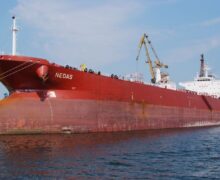
Seafaring: Bangladesh should learn from the mistake of the Philippines – Zaki Ahad
Bangladesh has about 5000 active seagoing officers and 2500 ratings, mostly serving on foreign flagged vessels of all major maritime nations. The seafarers have made the country a Category ‘B’ member of the International Maritime Organisation (IMO), the specialised organ of the UN in maritime sector.
The IMO White List: This implies that the maritime administration, standard of training and the quality of seafarers comply with the International Convention on Standard of Training, Certification and Watchkeeping (STCW) to which Bangladesh is a party by direct acceptance. It ensures that seafarers from Bangladesh enjoy the same status as that of any white listed country in the world and subject to mutual recognition as provided in the STCW convention, the employment of our seafarers are unhindered. The rapport of Bangladeshi seafarers are better than most competing nations.
However, the STCW convention has been amended and revised and it is essential that Bangladesh complies with the requirement of the amendment to the parent convention of 1978. These amendments are known as the Manila amendments and came into force on January 01, 2012. The International Maritime Organisation has also introduced mandatory voluntary audit scheme through which the organisation will audit member state’s ability as well as capability to comply with the requirement of the convention in order to remain on the ‘White List’ of states.
Very recently, the prime provider of seafarer in the international market in terms of number, the Philippines, was blacklisted by the European Union and the employment of their seafarers in European bloc has been hampered to an extreme extent. In fact, many Japanese ship-owners are now looking elsewhere to find officers and ratings to employ in their ships.
Bangladesh has recently obtained the recognition of the European Maritime Safety Agency (EMSA), the joint maritime administration of the European Union (EU), after it submitted rectification to the audit observations made by EMSA in 2006. Whereas, this is an achievement in the short run, the long-term prospect of Bangladeshi seafaring may be seriously affected unless immediate actions are taken to comply with the amended STCW convention in full. Bangladesh will be in danger of being blacklisted as has been the case with the Philippines. This would certainly spell disaster for the seafarers of Bangladesh and in order to employ seafarers for the growing Bangladeshi fleet of all-time high of over 80 ocean going vessels, we may have to look for foreign seafarers to man our own ships if we continue to trade internationally with our own flagged ships. In that case, all employment of our seafarers would immediately cease and all maritime training providers in Bangladesh would shut down.
The Department of Shipping, which is the executive organ of the Ministry of Shipping on maritime affairs as well as seafaring, has already conducted a workshop on voluntary audit scheme of IMO. Lessons learned from that procedure would help us to safeguard the interest of the nation.
Suggestions: The recommendations that may be made in view of the audit plans are as follows:
1. Re-structuring the Department so that adequate technical manpower is available to the Department of Shipping to comply with the requirement of the audit.
2. The examination cell as well as the monitoring cell in the Department needs to be established to oversee the quality of maritime education and training. The current situation would definitely put Bangladesh’s status at very high risk. The number of dedicated examiners for both deck and engineering department should at least be four in each department.
3. The distribution of technical updates at the IMO for seafarers, Bangladesh ships as well as the administration itself would require technical experts working under a cell that would be quite independent of the examination cell.
4. Port State Control regime in Bangladesh, which is rather weak, would need to be reinforced. This cell could also look into Flag State Control as well as the activities of the ROs.
Ratification needs to be expedited: The ratification of the current amendments to the STCW Convention needs to be expedited. Bangladesh was required to submit a report to the IMO stating the steps taken by the national administration by January 01, 2013, stating the steps it has taken in order to implement the amended convention. This would require both technical and legal experts and it would be prudent for Bangladesh to seek technical co-operation as soon as possible. The examination rules and regulations, which have largely been covered by Gazette notification, would have to be given legal frame.
Implementation of The Seafarers Identity Document Convention, of the International Labour Organisation (ILO), which has been partly implemented by Bangladesh in the form of providing a biometric identity document for all Bangladesh seafarers, needs to be implemented in full in order that our seafarers face minimum hassle when travelling to and from foreign land. The right of our seafarers of liberty to go ashore is largely restricted in foreign ports due to non-implementation of the convention. This is the job of the Ministry of Labour and Manpower and it will be in the interest of our seafarers if this is done without delay. We can take the instance of South America, where we do not have a full diplomatic mission, neither does any South American country has missions in Bangladesh. Being a non-signatory party to the convention means that we cannot send our seafarers for joining or leaving ships in South America as we are non-compliant with the convention.
The other pending convention that needs to be ratified and implemented as soon as possible is the Maritime Labour Convention of 2006. Whereas significant studies have been made in this arena, the failure to comply with the convention can lead to a decrease in the number of Bangladeshi seafarers being employed abroad, particularly those who are proceeding for employment without the assistance of manpower agents. Minor changes in our maritime labour rules would enable this convention to be ratified.
Visa problem: Visa restriction on Bangladeshis in general places immense hardship on our seafarers who intend to join or leave vessels in foreign ports. The particular points where our seafarers normally join or leave ships are Singapore, Indian ports, the EU countries and the USA. Our foreign ministry needs to be appraised of this and hold meetings representing our maritime administration in order to facilitate the visa process for seafarers as well as repatriation from their country.
The maritime administration needs to work closely with the Ministry of Foreign Affairs so that consular duties to seafarers are more easily understood and our seafarers are rendered all possible assistance in their movement to join and leave ships as well as repatriation when marooned in countries where we do not have diplomatic missions.
It is a welcome development that the Department of Shipping is updating its website to check online the certificates issued by the Department and also other ancillary certificates issued by approved maritime training providers.
Course curriculum for all approved maritime training courses and applicable for all institutes and academies are also being prepared in line with the current convention. This would definitely mark a step forward in the proposed IMO audit.
Monitoring cell: In order to ensure that proper training programmes are being followed, there is dire need for a monitoring cell comprising of local maritime experts who are independent of any links to any academy or maritime education training providers.
Wholesale approval of training institutes would definitely hamper progress in the sector as the current manpower in the Department of Shipping is inadequate to monitor even the existing ones.
Seafarers definitely appreciate quality training and not bluffs in the name of training.
The government needs to do more to organise the Department of Shipping, making it more dynamic and technically effective to achieve international standards.
To begin with, a permanent office would be a good idea. This is perhaps being expedited and within a few years may be implemented. What we need to do is keep pace with our competing nations so that we are not marginalised because of complacency.
As one of the prime professional group with perhaps the highest remittance, the Government needs to take a deeper look into the prospective future market so that the quality and the quantity of Bangladeshi seafarers and their interest, while they serve on board, are fully protected. A recent seminar held at Dhaka on seven Bangladeshi seafarers held by Somali pirates and the dire condition of their families had to some extent highlighted the risk to which seafarers are exposed.
———————
The writer is the Commandant, International Maritime Academy and Executive Director, Bangladesh Maritime Training Institute. zaki@bmti.org
http://www.thefinancialexpress-bd.com/index.php?ref=MjBfMDNfMjBfMTNfMV8yN18xNjM4MTE%3D
Published : Wednesday, 20 March 2013







![[নোঙর 2016] আমার সেরা বিদেশ ভ্রমন : নাফিসা মাশহুরা ইরা](http://bdmariners.org/wp-content/uploads/2016/06/Dubai-city-tour-70x70.jpg)




Recent Comments